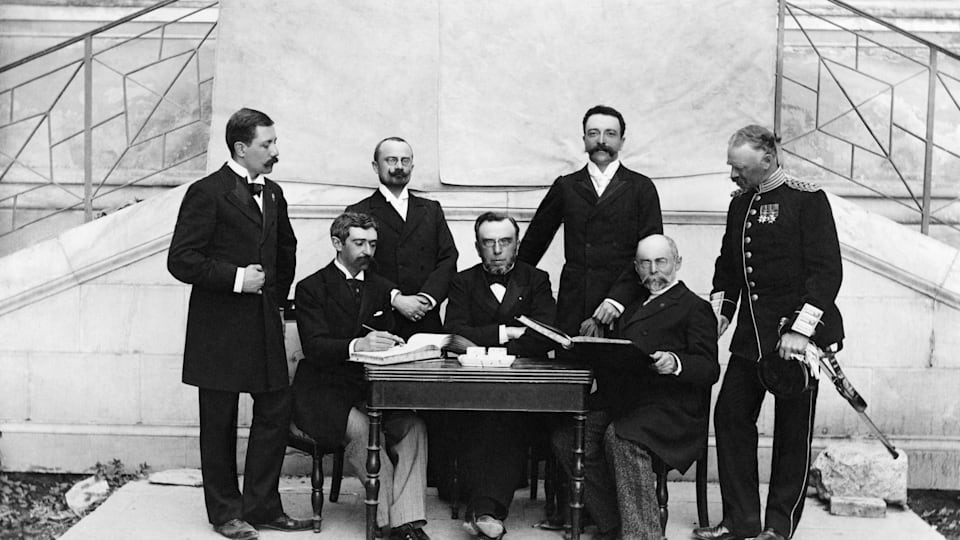Athens 1896: The revival of the Olympic Games
When, in Athens on 6 April 1896, the US athlete James Connolly won the triple jump event at the inaugural Olympic Games of the modern era, he became the first Olympic champion in more than 1,500 years.

The nine days of sporting events that followed proved largely successful, providing a platform for the Olympic Movement to step forward into the 20th century and stage the Games on a four-year cycle at different host cities around the world, a cycle that has only been interrupted by the two world wars of the 20th century.
The story of the modern Olympic Games began two years earlier, when the International Olympic Committee came into being in Paris. Its founder, Baron Pierre de Coubertin, then reached out to sports clubs around the world, inviting them to send delegates to the International Athletic Congress in the French capital with the aim of reviving the Olympic Games. When the delegates duly assembled, they unanimously agreed that the first Games of the modern era should be held two years later in Greece, where the ancient Games had been held, every four years for nearly 12 centuries, between 776 BC and AD 393.
Primarily part of a religious festival held in honour of Zeus, the father of the Greek gods and goddesses, the ancient Games took place at the sanctuary of Olympia, on the banks of the river Alpheus. Athletes from city-states from every corner of the Greek world were invited to take part, all of them male. When the Olympic Games revived in Athens 1896, they did so with an all-male field of entrants, 241 of them from 14 nations, competing in 43 events. The host nation fielded the largest team, followed by Germany, France and Great Britain.
By way of contrast, and as an indication of the extent to which the Olympic Games have grown over the years, the Games of the XXXIII Olympiad in Paris in 2024 saw some 10,500 athletes (with quotas divvied up equally among women and men) from the territories of all 206 National Olympic Committees. The 2024 Games held 329 events spread across 32 sports and 19 days of competition. Twenty of those events being mixed gender. The engagement of Paris 2024 saw over 12 billion engagements across the Olympic social media handles and approximately 300 million people accessed the Olympic web and app.
The only witnesses of those inaugural Olympic Games in the Greek capital were the people that turned up to watch the events, some 60,000 of them for the Opening Ceremony at the Panathenaic Stadium, the venue for the athletics programme. The stadium was itself a link with Greece’s ancient past. Originally built in 329 BC, it had been excavated several decades earlier and then abandoned before being restored to its former glory with white marble, symbolising to some extent the renaissance of the Games themselves.
As part of the preparations for the Olympic Games Athens 1896, work was carried out on the section of the Ilissos nearest to the Panathenaic Stadium. The existing bridge was widened, and two more bridges built to enable easier pedestrian access to the stadium. The area was reforested after the Games and the river now flows almost entirely through underground tunnels built during the Greek capital’s massive expansion in the early 1900s. An urban renewal plan is in place for the restoration of the Ilissos. The plan seeks to create a narrow mile-long park along the banks of the Ilissos, including the section that passes the Panathenaic Stadium, which has been overgrown and neglected for many years.
Made possible by major donations at a time when the Greek economy was struggling, the Games of the first Olympiad bore little resemblance to today’s Olympic Games. The years since Athens 1896 have seen myriad changes and innovations. They include the advent of the Olympic torch relay and the official Olympic film, the revival of the Olympic flame, changes to the opening, closing and medal ceremonies and to the events themselves, the arrival of new technologies in timekeeping and broadcasting to name but two fields, new techniques on the track and the field of play, and the drive towards gender equality. None of that would have been possible without the pioneers of Athens 1896, who took the first tentative steps towards a new century and helped map out the future of what has become the biggest sporting event in the world.